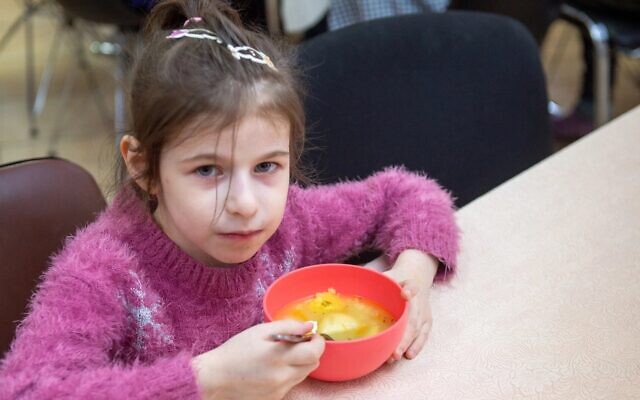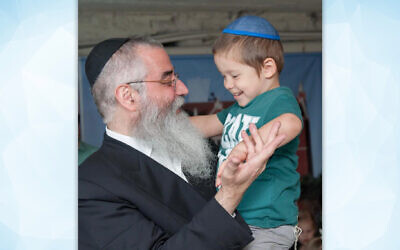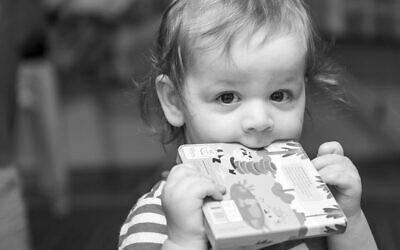As Ukraine war enters Year 3, Odessa Jewish Children’s Home struggles with new challenges
As the war in Ukraine enters its third year, the hardship has not eased for the estimated 30,000 Jews remaining in Odessa.

When Rabbi Avraham Wolff leaves the Mishpacha Children’s Home in Odessa, Ukraine, most evenings, he whispers a silent prayer.
He prays that the 120 children for whom his organisation cares will be able to sleep through the night, uninterrupted by air raid sirens and a race to the bomb shelter.
He prays that the food, education and warmth his staff provides will help them overcome the challenges of their circumstances so they can obtain the same opportunities as regular children.
He prays that he’ll be able to come up with the resources he needs to keep the Children’s Home running despite the war and the devastation it has wreaked on Odessa.
“Hardly a day goes by without some kind of trauma,” says Wolff, who in addition to running Mishpacha Odessa is a Chabad emissary and chief rabbi of southern Ukraine. “The kids meet with psychologists all the time. We’re coping with very trying circumstances.”
As the war in Ukraine enters its third year, the hardship has not eased for the estimated 30,000 Jews remaining in Odessa, despite the fading of the Russia-Ukraine war from international headlines.
There are still attacks on the city nearly every day, tens of thousands remain displaced, and many of those who remain are struggling with the loss of their livelihoods, homes and loved ones in the war.

In the midst of this, Wolff runs an orphanage for a Jewish population that was at high risk even before the war. About 70% children at his facility come from homes all over Ukraine where their parents (or, in most cases, single parent) could not care for them due to trouble with drugs, alcohol, crime, prostitution or mental-health problems.
About 30% of the children have no parents at all. A few arrived at the Mishpacha Children’s Home as newborns, straight from the hospital delivery room and with nothing other than their birth certificate.
Since the war began, seven new children have joined the orphanage, including two boys ages 4 and 5 whose mother disappeared during a bombing attack on Odessa six months into the war. They were brought to Mishpacha by neighbours.
Wolff’s job is to provide the children under his guardianship with a safe and nurturing Jewish environment from the moment they arrive until they go off on their own — often, only once they get married. They get food, clothes, schooling, healthcare, psychological counselling and love.
The children, of course, pay nothing, but the annual cost of running the separate boys’ and girls’ homes is $2.5 million. Wolff’s organization also runs a host of other Jewish institutions in Odessa, including two kindergartens, an elementary school, a high school, a Jewish university, a senior-care facility for Holocaust survivors and a home for war refugees.
In the early days of Russia’s invasion of Ukraine, with Russian warships anchored off Odessa’s Black Sea coast, missile attacks wreaking havoc in the city, and Russian President Vladimir Putin making specific mention of his ambitions for Odessa, Wolff made the difficult decision to evacuate all the children under his care to Berlin.

“The war had come to our home,” Wolff recalled. “Jews came to the synagogue in the morning with the paleness of fear of death covering their faces. If this anxiety hit everyone, how much more so did it strike the orphans, who are like our children.
This fear surrounded them and paralysed them. All the security that we instilled in them — which we worked so hard for, with dedicated teams 24/7 — was about to collapse.”
In a complicated logistical operation, Mishpacha arranged for the children’s evacuation in the midst of the fighting and despite the fact that many of them lacked passports.
The children went on a 52-hour overland journey accompanied by Wolff’s son Mendi and Mendi’s wife, Mushki, as well as Mishpacha staffers and Igor Shatkhin, president of the Federation of Jewish Communities in Southern Ukraine.
As soon as they arrived in Berlin, Shatkhin began organizing the evacuation of other Jewish children and women in Odessa who wanted to flee. The men had to stay behind due to Ukraine’s wartime conscription law barring most men ages 18-60 from leaving the country.
“We sent a message to the entire community: Women and children who want to go with us to Berlin to register immediately by phone and report the next day at 6 AM,” Shatkhin recalled. “The hysteria was so great that in less than an hour 180 women and children signed up.”
Wolff’s wife, Haya, accompanied these evacuees on their journey, but Wolff himself stayed behind. He had to care for those who remained in the city, including at a Mishpacha senior-care facility.
After a year, Wolff brought the orphans in exile back to the Children’s Home in Odessa, where they could finally feel at home again.
But they returned to a transformed city. The Jewish population had shrunk by almost half. The well-to-do local businessmen who in their philanthropic largesse had funded over 80% of Mishpacha’s budget had become needy themselves.
Parents who had managed until the war to hold onto their kids had become desperate and distraught. One child was brought to the orphanage after her mother was hospitalized at a mental-health facility following an attempted suicide.
These days, Wolff’s top priorities are dealing with the kids’ wartime traumas and increased mental-health needs while finding alternative sources of funding for the Children’s Home.
“Our donors have lost their businesses and are now asking us for food,” Wolff said. “Before the war we were supported almost entirely by the local community, but today there’s hardly a single dollar we’re able to collect in Odessa. We are 100% reliant on donors from overseas.”
Shatkhin says his Jewish federation is able to help some, but the lion’s share of support still must come from overseas. Mishpacha Children’s Home receives funding from organisations including the Jewish Relief Network Ukraine (JRNU), Kate and Marty Rifkin of the KMR Foundation, and the Patrick and Lina Drahi Foundation, but Shatkhin is seeking more help from American Jews.
“Our goal is to do everything we can to make these kids smile, despite their trauma,” Shatkhin said. “We want to continue to raise them and prepare them for independent, full and successful lives. But we need the Jewish world’s help.”
Since Oct. 7, Wolff has been caught up in a second war — the conflict in his native Israel, where Wolff still has plenty of family and which has drawn global attention away from the Russia-Ukraine war.
“The security and needs in Israel are very important to the Jewish world — and they are very important to me,” Wolff said. “But we can’t forget that there are thousands of Jewish children here in Ukraine, too, and they also need our love and support.”
To make a donation now to support Mishpacha Children’s Home, visit https://www.mishpachaorphanage.org/shelteringhearts.

Thank you for helping to make Jewish News the leading source of news and opinion for the UK Jewish community. Today we're asking for your invaluable help to continue putting our community first in everything we do.
For as little as £5 a month you can help sustain the vital work we do in celebrating and standing up for Jewish life in Britain.
Jewish News holds our community together and keeps us connected. Like a synagogue, it’s where people turn to feel part of something bigger. It also proudly shows the rest of Britain the vibrancy and rich culture of modern Jewish life.
You can make a quick and easy one-off or monthly contribution of £5, £10, £20 or any other sum you’re comfortable with.
100% of your donation will help us continue celebrating our community, in all its dynamic diversity...
Engaging
Being a community platform means so much more than producing a newspaper and website. One of our proudest roles is media partnering with our invaluable charities to amplify the outstanding work they do to help us all.
Celebrating
There’s no shortage of oys in the world but Jewish News takes every opportunity to celebrate the joys too, through projects like Night of Heroes, 40 Under 40 and other compelling countdowns that make the community kvell with pride.
Pioneering
In the first collaboration between media outlets from different faiths, Jewish News worked with British Muslim TV and Church Times to produce a list of young activists leading the way on interfaith understanding.
Campaigning
Royal Mail issued a stamp honouring Holocaust hero Sir Nicholas Winton after a Jewish News campaign attracted more than 100,000 backers. Jewish Newsalso produces special editions of the paper highlighting pressing issues including mental health and Holocaust remembrance.
Easy access
In an age when news is readily accessible, Jewish News provides high-quality content free online and offline, removing any financial barriers to connecting people.
Voice of our community to wider society
The Jewish News team regularly appears on TV, radio and on the pages of the national press to comment on stories about the Jewish community. Easy access to the paper on the streets of London also means Jewish News provides an invaluable window into the community for the country at large.
We hope you agree all this is worth preserving.





















